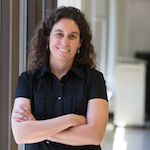
Amy Babinec, MFA’09
Adjunct Instructor of Art
Moraine Valley Community College, Palos Hills, Illinois
Harper Community College, Palatine, Illinois

Rosie Banks, AM’99, PhD’12
Associate Dean of Instruction
Harold Washington College
Chicago, Illinois

Jason Evans, AM’02
Professor of Developmental Writing and English
Prairie State College
Chicago Heights, Illinois
 Andrew Fansler, MFA’10
Andrew Fansler, MFA’10
Adjunct Instructor of Art
Forsyth Technical Community College
Winston-Salem, North Carolina
Interested in a community college teaching career? Four alumni share their experiences and advice for job seekers.
1. Show that you want to teach.
Rosie Banks: Hiring committees want to see a commitment to teaching and see that you really do want to be in the classroom. We want you to tell us what you think about teaching and student learning, and how does that work in the classroom? What do you know about assessment of student learning?
Jason Evans: Hiring committees can be skeptical of candidates from places like UChicago who are traditionally more focused on academic research. Talk about what you value as a teacher and how you think of your subject.
2. A commitment to teaching doesn’t mean you have to be an expert.
Evans: Successful job candidates also talk about teaching in a way that shows they don’t have all the answers. Even if you have not found all the right solutions in the classroom, make it clear to the hiring committee that you are interested in being part of a community to address these questions.
3. Engage broadly with your topic of study.
Evans: Some of my students at Prairie State College will be or already are teachers, nurses, or auto mechanics—how do you talk about your subject to that wide range of people? What is the value of your field? Have ready answers for these questions. Think about your field, not just your interest.
4. Know the institution.
Banks: Do your homework. Read and explore a prospective employer’s website and talk to as many people as possible to be fluent in the culture and the community of the institution.
Amy Babinec: I visited local community colleges after I graduated from UChicago to learn more about what the environment was like and that was helpful. Talking to both students and instructors gave me a better feel for who my audience as a teacher would be.
Banks: People can shadow an instructor in one of our classrooms to get a sense of what teaching here looks like. Ask the department chair or an administrator for permission.
5. Build on your UChicago experiences.
Evans: The Master of Arts Program in the Humanities prepares students well to be community college teachers. It has such an interdisciplinary feel and flavor to it that produces people who can be good liberal arts teachers.
Babinec: The Center for Teaching and Learning was very helpful. I learned how to assemble a teaching portfolio, write syllabi, and make clear goals for my courses.
Andrew Fansler: My experience working as a wood shop technician with sculpture students at UChicago improved both my technical and teaching skills.
6. Tap your network.
Babinec: Most of my positions began with me approaching them rather than responding to an advertised job opening. I also did informational interviews with full-time instructors at local community colleges to learn more about possible job openings and the institution.
Banks: I was encouraged to apply to a teaching position at Olive Harvey Community College on the South Side of Chicago by a friend who was a full-time faculty member. Networking from there with other instructors and administrators is how I began at Harold Washington. Particularly if you are applying for a part-time position, find the department, identify the department chair, and speak to them directly.

Add new comment